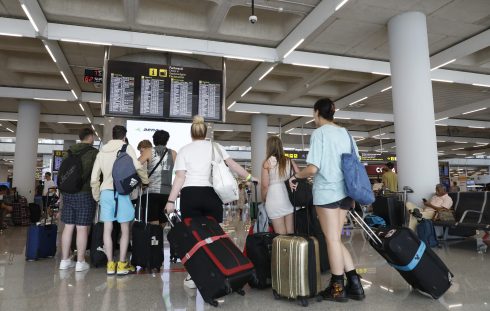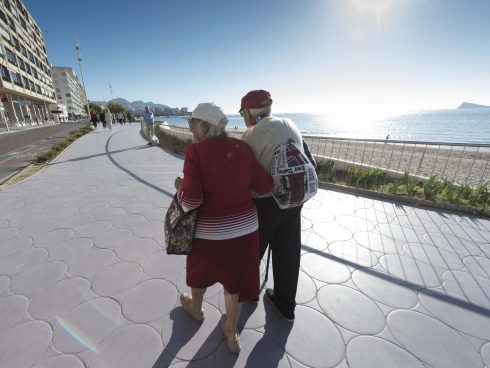AMIDST dozens of Brits being flown back to the UK and others being refused journeys by UK airline staff, the Olive Press can report on essential differences between one country’s travel ruling and another’s.
On Tuesday, March 30, we reported that 40 Brits had been refused entry to Spain at Alicante airport, DESPITE reassurances and confirmation from Ryanair staff that all documents were in order.
This morning, April 5, the Olive Press spoke with two passengers out of a group that were refused flights – by the same airline, at the same airport.
All travellers caught up in the confusion had checked what they had believed to be an entirely legitimate source of information, only to have their travel plans ruined.
At the time of this article being published, the gov.uk website clearly states on it’s ‘Travel to Spain’ page, ‘It is illegal to travel abroad from the UK for holidays.’
Continuing, ‘[From] England, you must have a permitted reason to travel abroad and complete the declaration form’
For UK residents, those permitted reasons include..
Work
Travel for business or work purposes where it is not reasonably possible to complete that work within the UK.
This includes but is not limited to essential work, in relation to critical national infrastructure including the national rail network, national security or diplomatic purposes.
Volunteering
To provide voluntary services, where it is not reasonably possible to provide those voluntary services from within the UK.
Education
For academic studies or professional qualifications where physical presence outside the UK is reasonably necessary or where activities must be completed overseas.
An international student studying in the UK can travel outside the UK to return home on one occasion before 29 April 2021 for the purposes of a vacation.
Medical or visits to provide care
This includes:
- where it is reasonably necessary to leave the UK to access medical treatment or attend a clinical appointment
- to accompany a person to a medical appointment where you are a member of their household, close family member or friend
- to avoid injury or illness or escape risk of harm (such as domestic abuse)
- to visit someone who is dying, critically ill, or receiving treatment in a hospital or hospice
- to provide emergency assistance
- to access maternity services, or to be with someone who is giving birth if the mother has requested you
- to be with a baby receiving neonatal critical care, where you are a member of the baby’s household, a close family member or a friend
- where it is reasonably necessary to provide care and assistance to a vulnerable person – this includes if the person is 70 or over, pregnant or has an underlying health condition
Weddings or civil partnerships
You can only travel out of the UK to attend your wedding or civil partnership, or a close family member’s wedding or civil partnership. In both cases one or both people getting married or entering into a civil partnership must live outside the UK.
Funerals
It is still a reasonable excuse to travel abroad for a funeral, but it will not be a reasonable excuse to travel for commemorative events, or to visit a burial ground.
Elite sports
It is a reasonable excuse to travel abroad if you are an elite sportsperson, a coach of an elite sportsperson, or a parent of an under 18 elite sportsperson, and it is necessary for training or competition for you to leave the UK.
Children and dependents
If you have a reasonable excuse for travel and it is not possible for alternative arrangements to be made for your children or dependent’s care, then your child or dependent will have a reasonable excuse for travel.
NB: All of the above permitted reasons need acceptable documentation to justify the reason for travel.
Other reasonable excuses
There are further acceptable reasons for travel, for example:
- to fulfil legal obligations
- to carry out activities related to buying, selling, letting or renting a residential property
- travel in order to exercise custody rights
- for the purposes of arrangements for contact between siblings where they do not live in the same country and one or more of them is in local authority care or equivalent from another country
- to vote in a referendum or election held outside of the UK and it is not reasonably possible to vote in the UK
- to present oneself to a judicial or administrative authority
Recommended evidence: proof of contract, court decision and proof of place of residence, order to present oneself to a judicial or administrative authority, expiring residence permit, dismissal notice, letter or appointment details from estate agent, relevant contract or letters detailing sales, or other appropriate documentation.
HOWEVER
The Consulate General of Spain has a different interpretation of what is deemed acceptable.
As of today, April 5, their website states…
“Since Brexit, the UK is considered a non-EU country, therefore, according to the Order INT / 657/2020.
– British citizens (as 3rd country nationals) can not travel to Spain at the moment.
– EU citizens and their relatives, including British ones, can.
This is a temporary regulation which restricts 3rd country nationals entering Spain for public health reasons due to the COVID-19 health crisis.”
The same Order specifies exemptions allowing entrance in Spain for non-EU citizens (including British citizens) in the following cases:
- residents of the EU, Schengen states, Andorra, the Vatican and San Marino who are traveling to their place of residence
- long term Spanish visa holders
- health care professionals and carers who travel for work
- transport workers
- diplomats, military and members of international organizations
- students with permission or Spanish visas and medical insurance
- highly qualified professionals in some justified cases…
- people who are traveling for essential and justified family matters
- force majeure* cases, necessary situations or humanitarian reasons
- residents of countries not affected by the restrictions.
*unforeseeable circumstances that prevent someone from fulfilling a contract.
The Spanish list of exemptions doesn’t specifically mention property matters, custody issues, voting in elections or presenting oneself to administrative authorities.
Although there is a vague reference to such activities, the Spanish list is not specific and is very much open to interpretation.
As we have stated in recent articles, regardless of how the rules and regulations are interpreted, the frustrating thing for travellers is the inconsistency of delivery.
And also, the final words from a British Embassy spokesman in Madrid, “Ultimately, the decision on whether to grant entry into Spain is made by Spanish border officials as set out in our Travel Advice.”
READ MORE
‘Fury’ at Spain’s Alicante Airport as 40 Brits deported back to UK after flight from Manchester
EXCUSIVE: Brits turned away from UK boarding gate by staff “acting on behalf of Spain”











